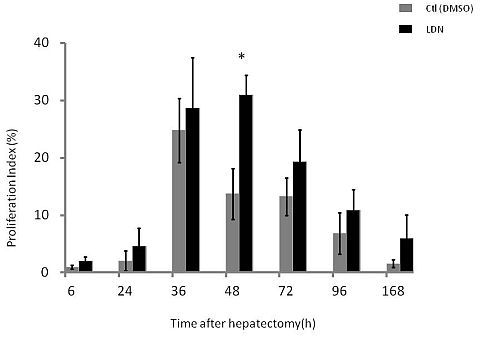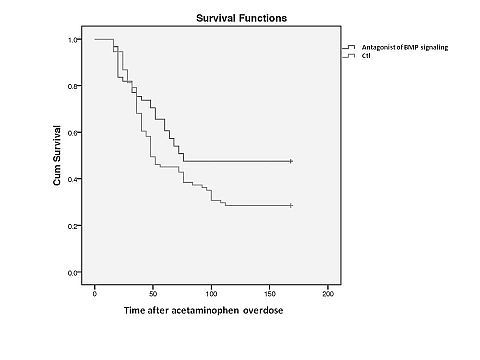Antagonists of Bone Morphogenetic Protein Signaling Promote Liver Regeneration and Repair in Mice
The Transplant Center and Department of Surgery, Vanderbilt University Medical Center, Nashville, TN
Meeting: 2013 American Transplant Congress
Abstract number: C1300
Pharmacologic agents to enhance liver recovery after injury would have wide therapeutic application. Based on previous work suggesting Bone Morphogenetic Protein (BMP) signaling modulates liver regeneration, we tested whether BMP antagonists improved the ability of the liver to recover after resection or toxic injury. In a 2/3 hepatectomy model in mice, the small molecule BMP antagonist LDN-193189 (LDN) enhanced restoration of liver mass in a dose-dependent fashion by increasing hepatocyte proliferation. Expression of genes known to be important for liver regeneration, including IL6, p53, SOCS3, and BMP4, were modulated by LDN. In contrast, LDN had no effect on the expression of p27, p21, c-JUN, or C/EBP-Α. In a mouse model of acetaminophen overdose, small molecule inhibition of BMP signaling improved survival by 60%.
Conclusion: These findings suggest that small molecule inhibition of BMP signaling may be a useful therapeutic strategy in human liver disease.

Administaration of LDN increases the number of hepatocytes that incorporate BrdU after hepatectomy. At 48 hours this difference is significant (N=4, P=0.001).

Antagonist of BMP signaling (dorsomorphin) improves survival after acetaminophen overdose.
To cite this abstract in AMA style:
Tsugawa D, Masuzaki R, Ray K, Karp S. Antagonists of Bone Morphogenetic Protein Signaling Promote Liver Regeneration and Repair in Mice [abstract]. Am J Transplant. 2013; 13 (suppl 5). https://atcmeetingabstracts.com/abstract/antagonists-of-bone-morphogenetic-protein-signaling-promote-liver-regeneration-and-repair-in-mice/. Accessed February 26, 2026.« Back to 2013 American Transplant Congress
